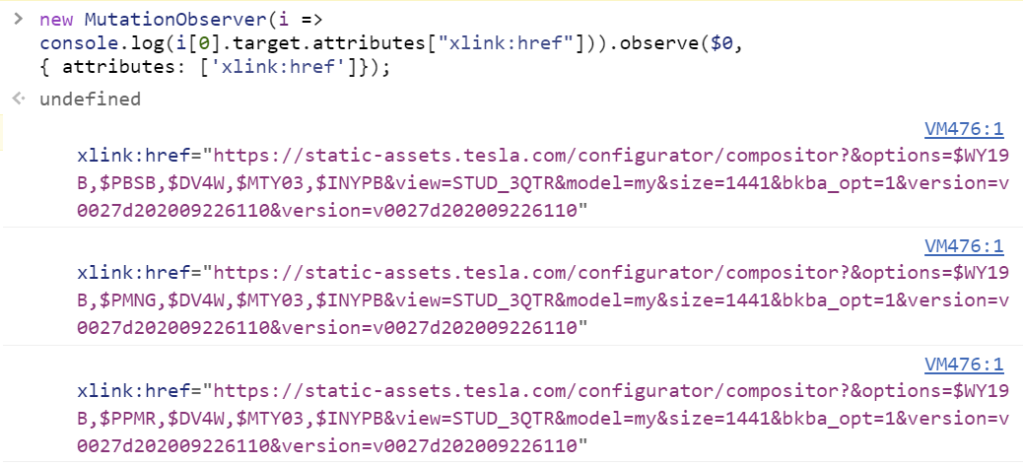Recently, I was debugging a regression where I wanted to watch change’s in an element’s property at runtime. Specifically, I wanted to watch the URL change when I select different colors in Tesla’s customizer. By using the Inspect Element tool, I can find the relevant image in the tree, and then when I pick a different color in the page, the Developer Tools briefly highlight the changes to the image’s attributes:

Unfortunately, you might notice that the value in the xlink:href property contains a ... in the middle of it, making it difficult to see what’s changed. I noted that the context menu offers a handy “Break on” submenu to break execution whenever the node changes:

…but I lamented that there’s no Watch attribute command to log the changing URLs to the console. Mozillian April King offered a helpful snippet that provides this functionality.
After selecting the image (which points Console variable $0 at the element), type the following in the Console:
new MutationObserver(i => console.log(i[0].target.attributes['xlink:href'])).observe($0, { attributes: ['xlink:href']});
This simple snippet creates a MutationObserver to watch the selected element’s xlink:href attribute, and every time it changes, the callback writes the current attribute value to the console:

Cool, huh?
Thanks, April!
-Eric
MutationObserver is definitely cool. Here’s another snippet that I use to allow the callback to make changes to the observed element without causing an overflow:
class MutationHelper {
#handler;
#opts;
#observer;
#element;
constructor(handler, opts) {
this.#handler = handler || console.info.bind(console);
this.#opts = opts || { childList:true, subtree:true, attributes: true, characterData:false };
this.#observer = new MutationObserver(this.#callback.bind(this));
}
#callback(records) {
//
// detach observer in case #handler makes DOM changes
this.#observer.disconnect();
//
// return false from #handler to stop receiving events.
if (this.#handler.call(this.#element, records) === false) {
return;
}
//
// re-attach observer
this.#observer.observe(this.#element, this.#opts);
}
observe(element) {
this.#element = element;
this.#observer.observe(this.#element, this.#opts);
}
}
//
//
new MutationHelper(myFunctionThatAddsElements).observe(document.body);